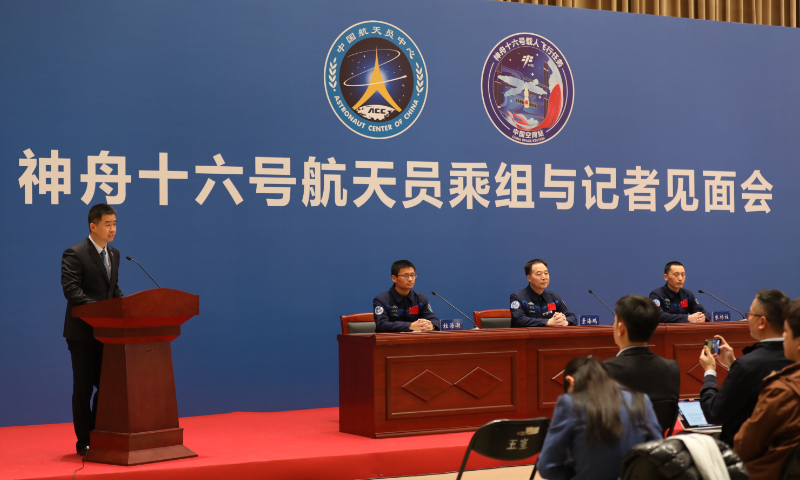Fully recovered from months-long space stay, Shenzhou-16 crew makes first public appearance

Photo: Deng Xiaoci/GT
Shenzhou-16 crew members, led by their mission commander Jing Haipeng, made their first public appearance some 80 days after safely returning to Earth, on Friday at the Astronaut Center of China in Beijing.
During the Friday press news conference, Chen Dong, the commander of the Chinese astronaut team, outlined the recovery situation and future plans of the Shenzhou-16 crew following their return. "The recovery period after the normal return of the crew is mainly divided into three stages: isolation recovery, recuperation recovery, and recovery observation. As of now, the Shenzhou-16 crew has completed the first two stages of work."
Under the careful protection and care of the research support team at the China Astronaut Research and Training Center, the Shenzhou-16 crew members are in good physical and mental condition, with a stable weight at pre-flight levels. Muscle strength, endurance, and cardiovascular function have basically recovered to pre-flight levels, Chen revealed.
Taikonauts of the Shenzhou-16 crew Jing Haipeng, Zhu Yangzhu, and Gui Haichao flew into space aboard the Shenzhou spacecraft on May 30, 2023, and rode the Shenzhou-16 manned spacecraft's return capsule, which successfully landed at the Dongfeng landing site. The three taikonauts are in good health, and the Shenzhou-16 manned spaceflight mission achieved complete success.
The Shenzhou-16 mission marked the first manned spaceflight mission of China's manned space program in the China Space Station's new application and development phase.
During their 154-day orbital stay, the crew conducted one extravehicular activity, known as the spacewalk, and the fourth Tiangong space lecture series session.
They also collaborated on multiple extravehicular tasks for the space station, laying the foundation for the normalization of space station missions.
The crew carried out numerous experiments and research, achieving significant progress in areas such as space life sciences, human research, microgravity physics, and new space technologies. This mission marked a crucial step in the transition of manned space projects from construction to application and from investment to output.
The team of astronauts, known by netizens as the "PhD crew," also set several milestones during the mission: it was the first time a crew was made up of three types of astronauts, namely spacecraft pilot, spaceflight engineer and payload specialist."
It also marked the first spaceflight for Chinese spaceflight engineers and payload specialists.
Jing Haipeng, flying for the fourth time, became the Chinese astronaut with the highest number of spaceflights to date.
At the Friday event, Jing told media that "the pursuit of dreams has no punctuation marks; the journey of progress is endless. The successful completion of each manned space mission is the beginning of the next flight mission. Currently, the project has entered a new phase of space station application and development. Taikonauts are steadily advancing, leaving footprints with each step, constantly reaching new heights, creating Chinese miracles, and paving the way upward for the dream of the space station."
Speaking about his first spacewalk experience, Zhu Yangzhu said, "There was no nervousness or uneasiness as imagined; instead, it was calm, composed, relaxed, and enjoyable, with a focus on how to successfully complete the task."
"As a spaceflight engineer performing the extravehicular task, I deeply felt the strength and confidence of our motherland. I also keenly experienced the thriving development of the aerospace industry and sincerely appreciate the greatness of the new era. It is the new era that allows us to have dreams to pursue, and pursuing dreams has become achievable," Zhu said.
As the first payload specialist of the China Space Station, Gui Haichao said on Friday that he felt particularly fortunate, happy, and proud to conduct scientific research in space. "The experimental cabinets for scientific research and various extravehicular experiment devices are international advanced-level space science experiment platforms. This represents the achievements of our country's aerospace industry," Gui said.
As for his future plans, Gui said, "Whether in space or back on Earth, I will always carry the universe in my heart, integrating knowledge and action, and practicing the original mission as both an astronaut and a teacher through concrete actions."
He continued, "I look forward to another trip to the Chinese space station, exploring more scientific mysteries!"

